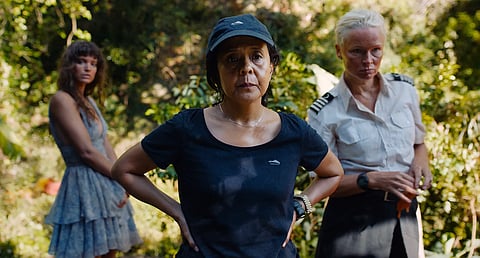
- NEWS
- the EDIT
- COMMENTARY
- BUSINESS
- LIFE
- SHOW
- ACTION
- GLOBAL GOALS
- SNAPS
- DYARYO TIRADA
- MORE

There's an Abigail in each of us, consciously or not.
I was fortunate to have seen the acclaimed film Triangle of Sadness, written and directed by Ruben Östlund, with the character played by the talented Dolly de Leon resonating with me.
The dark satire's first half introduces Abigail as a hardworking, dutiful toilet lady — an OFW who has joined a luxury liner with filthy rich passengers who can afford to buy even the souls of the boat's staff.
The second half of the movie brings an abrupt wind of change as the toilet lady who has all this time led a hard life suddenly asserts herself after the luxury liner encounters all sorts of disasters: Rough weather, vomiting passengers, overflowing toilets, pirates, and its blowing up and sinking.
While the others use lifeboats to get to a seemingly uninhabited island, Abigail arrives in a small steel evacuation vessel with some rations. Stranded along with a handful of white survivors (and one black man who is reflexively suspected of being a pirate), Abigail takes charge, giving the powerful punchline, "On the yacht, toilet manager. Here, captain."
In an interview, De Leon said her profiling of her character is someone who grew up in a really impoverished fishing town in the Philippines. With no implements, Abigail grew up learning how to fish with her bare hands. This skill proves to be useful as she catches fish to feed the other survivors on the island.
Out of attraction, she invites the male fashion model Carl (played by Harris Dickinson) to sleep in the vessel with her. But it becomes more than that as Abigail satisfies her sexual needs with him. While the other survivors are in shock, Abigail seems to have a more pragmatic take on this development.
The emancipation of Abigail
While the film is meant to be a dark comedy, it's likewise about Abigail getting empowered as a woman. The loss of material things among her companions is the great equalizer since their source of happiness is really that — money and objects. But Abigail seeks her happiness finally on her own terms. Not the one designed by a male-dominated society where women are expected to be happy for those they serve such as family or a life partner, but for herself. For the first time in many years perhaps, Abigail honors and fights for her desires, bringing along a cooperative Carl.
Abigail's character keeps it real, devoid of romantic notions. It's not the superficial happiness where life becomes ideal and laughable. She knows very well that what she and Carl have is an arrangement, a momentary pleasure that will also have its end. Abigail's deeper happiness here is her freedom to be the woman she wants to be — someone in control of her body, her life.
Alienated by her punishing work and her difficult circumstances, Abigail takes the brave recourse of choosing what she really wants: To be touched, to make love, to connect with another person, to be seen for her truth — though one that will have its harsh conclusion toward the end of the film.
De Leon delivers a deep-focused portrayal of Abigail, shedding fragile layers of her complex persona: from the light-heartedness of a toilet manager on the surface to the brewing pathos of a woman who has gone through hardship. De Leon triumphs in flinging Abigail onscreen to ruffle stereotypes and viewers' comfort zones. Bravo, Dolly!
Life is impermanent. In dark times, every human being goes through upheaval. But the gift of this pandemic is perhaps the realization that we need to be brave, to learn not to endure any more rejection and bitter pain caused by others, and even the pain we inflict on ourselves.
In the end, Abigail's cathartic anger and revenge become her powerful choice. There is no turning back.
